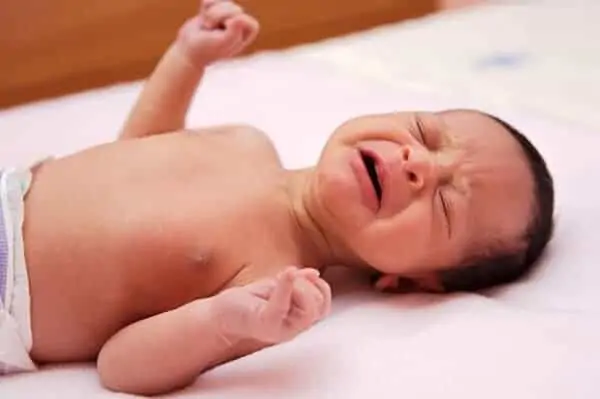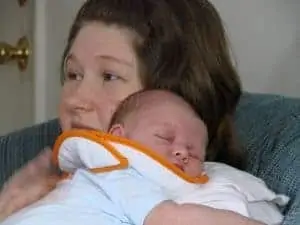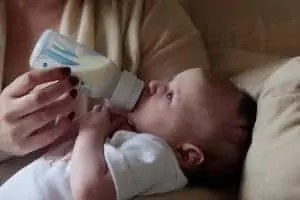Do baby farts smell really bad? Like so bad that the paint has started peeling off the walls in the nursery?
Farting is all a part of normal, healthy life. And it can be a window, even a smelly one, into your baby’s health. Those stinky infant farts can determine whether things are going well or if you need to head to the pediatrician.
It’s not just formula-fed babies, either. A breastfed baby could have stinky gas and poop too. You may notice either a baby with smelly farts and crying or that your baby hasn’t pooped and the farts stink.
To determine if it’s normal or warrants a call to the doctor, you’ll have to do detective work on those smells. So let’s discuss why baby’s farts stink!
Why does my baby’s fart smell so bad?
First, I’d like to call attention to your own farts. Admit it. You fart. We all do. It took ages for my eldest to admit she farted. She would become indignant at the mere suggestion of it, even as the rest of us struggled not to succumb to the ghastly fumes she left behind.

Well, babies can have different-smelling gas that will depend on what they’ve eaten. It could be the formula. It could be whatever you’ve eaten and passed along in your breast milk. It could also be the work of solid foods as you introduce them.
There’s a wide range of normals here, so the first thing to do is learn what is normal for your baby. It might be a great idea to keep a journal to help you record your findings.
In the journal, you should note how often your baby farts. It’s worth noting that when your baby (and you, too) passes gas, it consists of a blend of gases. Carbon dioxide is one, while methane, hydrogen, oxygen, and nitrogen are the others.
But one gas can make baby farts smell like rotten eggs, even in the smallest amount. That gas is sulfur. If your newborn farts smell like eggs, it’s this gas’s fault.
Every smell your baby produces out of her tiny tush is the by-product of breast milk or formula compounds. Most of the smells, no matter how unpleasant, are normal. We’ll get to that further below if the baby has smelly gas but no poop. Even if baby farts smell like vinegar, you’ll be able to discover what that means for your baby’s health.
Here are the types of farts you may find your baby makes…
- Completely odorless
Ah, these are the best kinds of farts because they don’t smell. These are normal, and while you may hear a loud toot, it is likely due to them swallowing air if no smell arises. This is common while crying.
Another reason for no smell during farts is that the breakdown of food in the digestive system has gone well. When you hear a fart but smell nothing, that’s great news for the baby’s health. And for your nose.
But don’t worry if you do smell something. It doesn’t always mean a trip to the doctor’s office!
- Mild sulfuric smell
I had to stop eating broccoli for a spell when my eldest was a baby. The reason was that it caused her to be gassier. She cried a lot on top of that, so all that swallowed air and my love of broccoli, food with higher sulfur compounds, resulted in some newborn farts that smelled like eggs.
You may notice a mildly sulfuric smell when breastfeeding and eating beans, broccoli, cauliflower, or brussels sprouts. It will smell and be a bit gross, but it won’t clear out a room. You may need to adjust your diet, in this case, just for a short while until her digestive system develops more fully.
Now, this strong sulfuric smell is genuinely unpleasant. I have to admit it happens to me when I eat LOTS of protein, especially when I indulge in red meat. Maybe that’s TMI, but I can clear a room with that.
The same is true for babies. Gases that break down from veggies will make them gassier, but meat compounds make for smellier gas because they have higher sulfur compounds. So, if you’ve been eating a lot of red meat and breastfeeding, get ready for farts from your baby that may make your eyes water.
- Totally rank-smelling gas
Now let’s talk about the kind of farts that even the family dog will run from. When baby farts smell like vinegar or anything else foul or sour, there may be a reason to be a little concerned.
For formula-fed babies, if the formula contains lactose, it may upset your child’s digestion. Check the labels on the formula you’re using, and if you see lactose listed there and are noticing totally stinky farts coming out of your child, you’ll want to discuss it with the pediatrician.
Alternatively, if you’re breastfeeding, it could be the dairy you’re eating that is setting off these foul smells. Lactose overload is one of the biggest reasons for baby farts that smell like vinegar (and bowel movements, too, incidentally).
Lactose is in your breast milk, but the problem comes when your baby doesn’t produce enough lactase, the enzyme that processes it. Sometimes, this is all just temporary.
If you’re breastfeeding, you may want to ensure your baby is getting more of the hindmilk in every feeding before you panic. The foremilk comes out first and has a less fat content.
You may see that your baby’s poop is darker when this happens. That’s due to the lower fat content. You can resolve this by making sure your baby completely drinks down the milk from one breast first before switching sides and offering the other breast.
What if you can’t determine which food is making baby gassy?
If you jot things down in a journal, it should point to a pattern. But what if you’ve diligently been recording what you eat and what your baby eats, and nothing seems to reveal anything?
It could be a stomach infection. But don’t worry needlessly. Stomach infections become pretty obvious right away. If your baby has one, she will be gassier and make more poop than usual. She’ll likely vomit, too, and have poor eating and fussiness. There may or may not be a fever, but for any baby less than 3 months old for any reason, if you record a fever over 100.4F, you’ll need to go to the doctor.
Does formula give babies smelly gas?
Bottle-fed formula babies can make some smelly gas, too, if they react to the formula you use. You can expect some typical fart smells most of the time, though. This will change once you start introducing solids.
If you’re worried about the formula setting off a food intolerance, watch for gas and bloating together. This is a big clue that something is off. Additionally, diarrhea will usually pop up if there’s an intolerance to the particular formula you’re using.
For formula-feeding babies, if you have any concerns about the formula you’re using, you should speak to your doctor.
Is it normal for babies to fart a lot?
Absolutely! In fact, that’s the funniest part of babies. They just randomly fart like the rest of us.
But if your baby seems gassier than usual, cries more than they normally do, or hasn’t pooped in a few days, there is cause to be concerned. Mostly though, it will all balance out as their digestive systems develop.
Here’s what might be making baby fartier than usual…
- Digestion development
Babies aren’t born with digestive systems that function as efficiently as ours. There’s not enough of the good gut bacteria in there yet. As such, it may take time to work out the kinks. Some babies squirm more or arch their backs until that glorious fart bursts out for immense relief.
- You’re not burping baby enough
It could also be that you’re not feeding them in a conducive way. Some babies are more prone to gas and reflux and will benefit from more upright nursing or bottle-feeding positioning.
Other times, it may be that you’re not burping them enough. As mentioned, babies are still developing in the digestive system. Burping them during and after feedings can help with the gas situation.
- Sensitivities or intolerances
Above, I spoke of this, which is one reason you may have a gassy baby with stinky farts. If you can’t pinpoint the food source that makes your breastmilk harder for the baby to digest or something with the formula you use, you may want to schedule a checkup with the pediatrician to see what is causing it.
- Constipation
This is more of a concern for babies that have a formula or when your baby starts eating solids. Some parents freak out if the baby doesn’t poop every day, but you can ask the doctor – it’s totally normal.
What isn’t normal? If the poop isn’t soft and moist. You’ve got a constipated baby if you find dry, hard poops.
- Lots of crying

Do you know how I always remind you that crying is a late hunger cue? Avoiding that will help keep the baby from getting gassy. Crying involves gulping down lots of air and can result in a fartier than usual baby.
- Lack of movement
Newborns, in particular, are very sedentary. They spend much time sleeping or reclining, so they need help pushing that gas out. Some babies will be visibly agitated by this gas, while others will bust out a ground-shaking fart without batting an eye.
What does it mean when a baby farts and cries?
They could have bad gas and need some help getting it out is usually what it means. In time, it gets better.
What you can do to help:
- Burp your baby often and the right way after each feeding session. This can cut down on trapped gas. The gas has to get out somehow, and burping can alleviate it. It’s still natural for a baby to fart, too, though.
- Look at the bottles. Are you trying to feed the baby too much at once? Are you using the wrong nipple? Check out my post about boob-shaped bottles that can help!
- Do baby exercises. You can help your baby squeeze out gas by bicycling their legs, dancing with them, or even massaging them.
- Look into allergies. About 7% of babies under the age of one are allergic to cow’s milk. Your doctor can help determine if that’s the case.
- Try a product that could help, like these gas relief drops for babies. Of course, you should consult your pediatrician before giving anything to a baby first.

On that last point, I just want to add that it’s not just lactose. Cow-milk-based ingredients like casein and whey could do it. And in a formula, sugars, grain or wheat proteins, added flavors, or dyes may also cause more gas.
Breastfeeding mamas will want to pay more attention to their eating foods to see if they’re causing tummy turmoil. Again, keep a journal to see. Dairy products and milk may set the baby off even through your milk. Common offenders are processed foods, spicy and sugary foods, beans, onions, and garlic.
Do babies fart if they are constipated?
Yes, they still fart if they’re constipated. They can pass gas but not make poop. If your baby hasn’t pooped in a few days and makes a hard poop, that’s constipation.
Sometimes though, a baby might be gassy between poops and then poop out a completely normal poop. See what we discussed above to help get that gas out if that’s the case. It could be that they’re not being burped enough.
Remember:
If it’s constipation, the baby will cry or be irritable. She’ll also have a decreased appetite. And she will seem to strain or turn red like she’s trying to squeeze out a poop, but nothing comes out. When something does come out, it is dry and dark in color.
Constipation commonly affects babies and toddlers, so getting things moving is encouraged. Any baby under 6 weeks who isn’t pooping or rarely does needs to see the doctor immediately.
For all babies, if you have vomiting, a baby that refuses to eat, excessive crying, a bloated belly, fever, and back arching like they’re in pain, it’s important to see the doctor.
Even if your baby is constipated, you’ll get through this, and everything will be ok. Keeping up hydration is essential and is the most common cause of constipation to begin with. Remember, babies, drink breastmilk to eat and quench thirst, so be sure your milk is healthy by hydrating yourself and eating right too!
Leslie Berry lives with her husband and two young daughters in Los Altos, California, where she loves helping other moms get comfortable with motherhood and embracing the insanity with facts peppered with laughs.
She loves eating too much sushi, exercising, and jamming out on her Fender. Read more about Leslie here.






